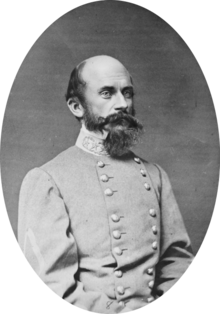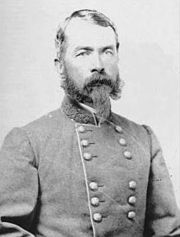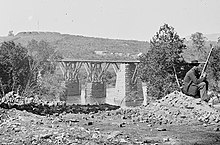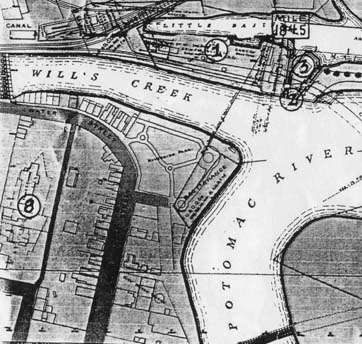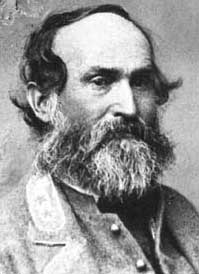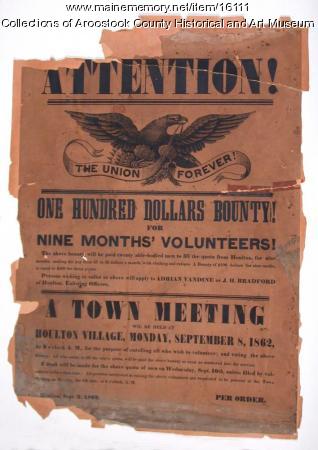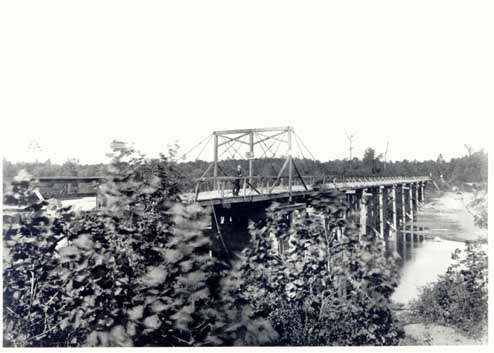 |
| General Raleigh A. Colston |
HEADQUARTERS,
Savannah, Ga., January 14, 1864.
Brigadier General THOMAS JORDAN,
Chief of Staff, Charleston, S. C.:
GENERAL: The past two or three days have brought to light a bad state of
affairs here. Among the troops stationed at the batteries on Rose Dew
Island, mouth of the Little Ogeechee River, there are at least a few men
of bad spirit who have been attempting to excite the troops there and
at other points around Savannah to acts of insubordination and
desertion. It is to be feared even that a spirit of discontent has
spread throughout the whole command at Rose Dew, extending possibly to
other companies.
As reported by a corporal stationed at Beauleiu, the conspirators
proposed to march away from their post on the island yesterday evening,
going in a body with their arms to the interior of this State. They
expressed themselves tired of the war and said they thought such a step
on their part would end it. A secret oath had been exacted of all
admitted to their confidence not to divulge their intentions.
Believing these reports might be well founded, I advised
Brigadier-General Mercer, commanding the District of Georgia, to send
Colonel Olmstead's regiment and a part of Colonel Gordon's command
last evening to take position near the Little Ogeechee to observe the
enemy in his threatened advance from that quarter, with private
instructions to watch the garrison at Rose Dew Island.
These dispositions were made and the suspected troops watched. No movement was attempted by them during the night.
By order of General Mercer a board of officers is now engaged in a rigid
investigation of the whole matter, and as soon as the facts are known
the guilty men will be arrested and placed in close confinement for
trial and punishment. This spirit of discontent has ripened into an
intent to desert under the influence of idleness, a want of active
service for officers and men, and I am satisfied it will be best to
exchange some of the troops here for others, sending the disaffected to
Charleston or some other point where they will be in the presence of the
enemy.
The companies at Rose Dew are Company F (Captain J. W. Anderson),
Company I (Captain Elkins), Fifty-fourth Georgia Regiment, and Jackson
Guards (Captain Tanner), who claims to belong to the Fourth Florida
Battalion, but is considered here as commanding an independent company.
There are two other companies of the Fifty-fourth Georgia Regiment here,
commanded by Captains Russell and Brantley; the latter is with the
siege train.
As a change of duty may be the means of improving the tone of these
disaffected troops, I propose to order the four companies of Colonel
Way's regiment, Fifty-fourth Georgia, and the Jackson Guards, Captain
Tanner, to the Third Military District of South Carolina, and replace
them here by the Twelfth Georgia Battalion, Major Hanvey.
The Fifty-seventh Georgia Regiment should be sent on duty in presence of
the enemy, say at Charleston or some other point, and another regiment
sent here to replace it. The men of this regiment complain, as stated by
Brigadier-General Colston, that they were not properly exchanged after
their capture at Vicksburg. Will the commanding general take these
troops to Charleston and send a good regiment to replace them here? If
this cannot be done, perhaps an exchange might be arranged so as to
bring a regiment from the Army of Tennessee or from Virginia.
The inclosed report from Brigadier-General Colston gives a clear
statement of what has transpired up to this hour, and I concur fully in
the recommendations therein made. Prompt action will probably be the
means of avoiding future trouble, and add to the general efficiency of
our available strength.
The individuals found guilty of exciting their companions in arms to discontent and desertion should be promptly punished.
I am, general, very respectfully, your obedient servant,
J. F. GILMER,
Major-General and Second in Command.
HEADQUARTERS COLSTON'S BRIGADE,
January 14, 1864.
Captain G. A. MERCER,
Assistant Adjutant-General:
SIR: On Tuesday, 12th instant, a communication was received from Captain
Hanleiter, commanding Beaulieu Battery, to the effect that a
non-commissioned officer had informed him of the existence of a plot among the garrison at Rose Dew, the purpose of which was to abandon
the post at Rose Dew with arms, ammunition, &c., to win over the
troops at Beaulieu if possible, to advance toward Savannah, taking with
them the Terrell Artillery at White Bluff, whose adhesion was considered
certain, also some State troops camped on the Skidaway road, and to
come to the camp of the Fifty-seventh Georgia, upon whom they seemed to
rely as ready to join them, the whole to make their way to the interior
of the country, their avowed purpose being to induce by their example as
many of the troops as possible to imitate them and by refusing to bear
arms any longer "to put an end to the war." The plot was to be executed
on last night. I immediately send Captain W. T. Taliaferro, my assistant
adjutant-general, to Beaulieu and Rose Dew to investigate the matter.
In the mean time an order was sent from district headquarters for the
arrest of Private Coleman, Company F, Fifty-fourth Georgia, and he was
sent on to the barracks at Savannah. From the result of investigations
made by Major Hartridge, commanding at Rose Dew, and Captain Taliaferro
it became evident that the plot, which at first appeared so improbable,
did really exist.
On yesterday I ordered about 300 men from the First Georgia Regiment and
the First Florida Battalion, under the command of Colonel Olmstead,
First Georgia, to repair to the causeway connecting Rose Dew Island with
the mainland and cut off the communication between the two. Captain
Guerard's battery of artillery was ordered to support him. One hundred
and fifty men from the Sixty-third Georgia Regiment, under Major Allen,
were ordered to report to Colonel Olmstead. These movements of troops
were made ostensibly for the purpose of meeting some demonstrations of
the enemy by way of the Ogeechee.
No attempt of any kind was made on last night by the garrison at Rose
Dew. The arrest of Coleman and the concentration of troops has evidently
frustrated the design, but from the report of Sergeant Hinson to
Captain Tanner (Jackson Guards, at Rose Dew), the attempt was not given
up until late yesterday evening. Another non-commissioned officer
confessed last night to Captain Tanner that nearly the whole company had
agreed to go off that night. All the parties concerned were pledged to
secrecy by an oath.
A board has been ordered by district headquarters to investigate further
into the matter. The troops sent to Rose Dew to check any attempt will
remain there until further orders. I would respectfully offer the
following suggestions:
First. That a court-martial be convened forthwith for the immediate
trial of the parties implicated; that the proceedings of this court be
revised at once by the proper authority and the sentences be immediately
carried into effect. A terrible and very prompt punishment is
indispensable in such an extreme case.
Second. That the troops at Rose Dew be removed from that post and their
place supplied by others upon whom reliance can be placed.
Third. That the Fifty-seventh Georgia Regiment be transferred either to
the Army of Tennessee or of Virginia. The spirit of this regiment (the
Fifty-seventh Georgia) is bad. The troops say that they have never been
properly exchanged, and the impression prevails, probably with good
reason, that they will not fight if brought before the enemy. They are
demoralized by the influence of home, to which they are too near, their
friends and relatives persuading them that they have not been properly
exchanged and ought to be at home. Their presence here may have a bad effect upon the other troops
and their spirit and tone may be improved by removal to more distant
points.
It will be necessary, of course, to send other troops in the place of those removed.
I am, sir, very respectfully, your obedient servant,
R. E. COLSTON,
Brigadier-General, Commanding.
Official Records, Series I., Vol. 35, Part 1, Pages 529-532.
This is one of the most advanced plots at mutiny during the war. The plan was to take the command and march on Savannah and then to the interior of Georgia, inducing troops they encountered along the way to end the war. It had little hope of success, but it another reflection of the dire state of affairs in the Confederacy at the start of 1864. A key point made by Colston is that being close to home actually acted as an inducement to mutiny, as it was too easy to be influenced by a civilian population much more disenchanted with the war than the military was.




